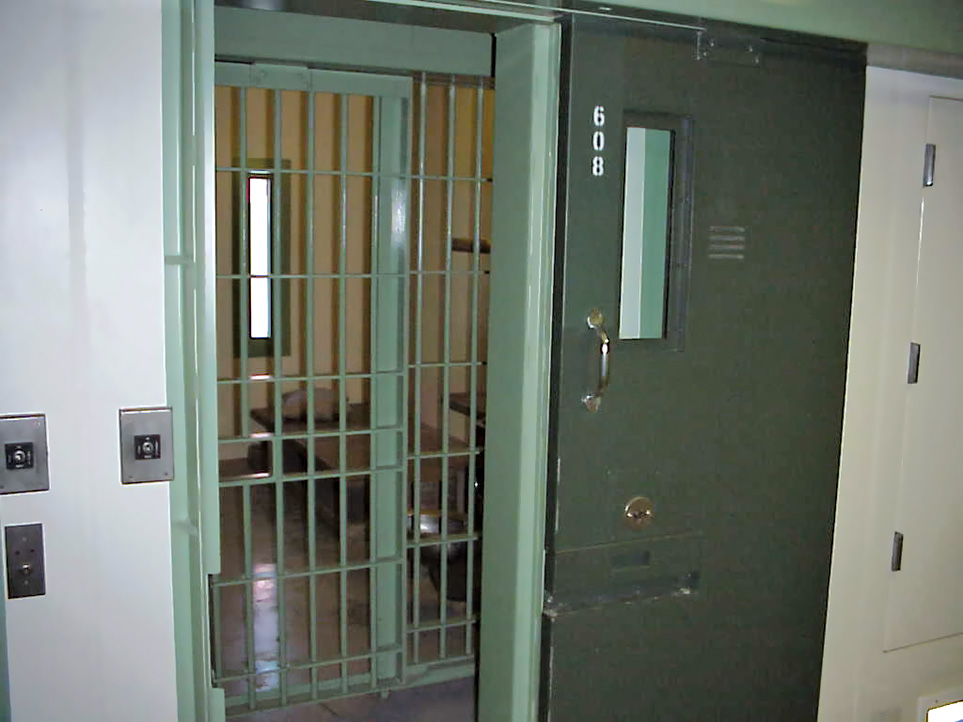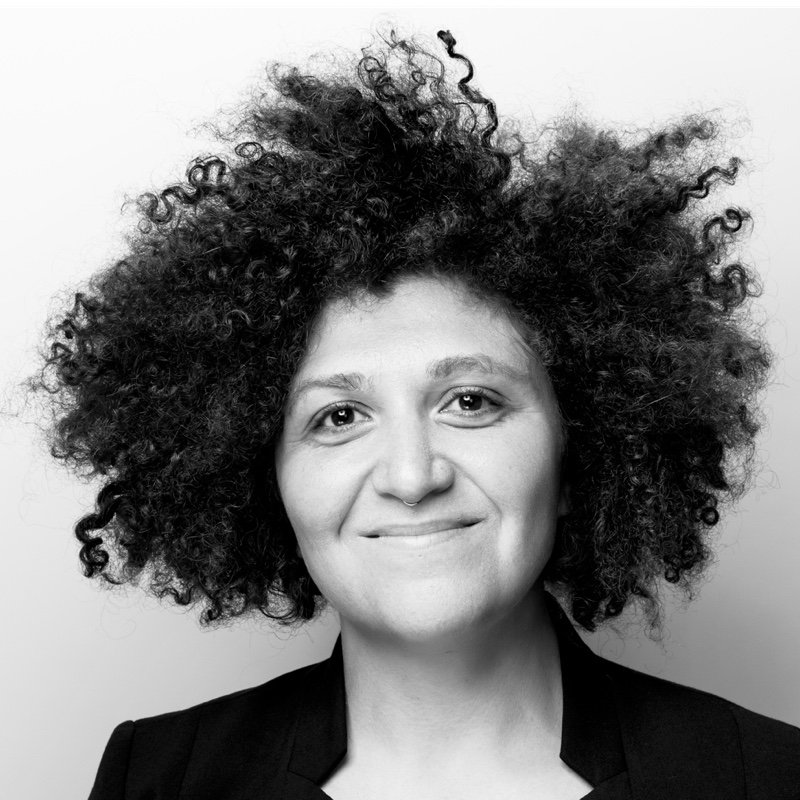
It was November 11, 2015, and Mohammad Salameh hadn’t eaten in 34 days. The morning was stretching toward noon, and he was lying on a concrete platform that served as his bed when a team of guards dressed in riot gear appeared at his cell door and ordered him to cuff up. A week earlier, Salameh failed to comply with that demand—he’d been too weak to stand and walk to his door—so guards had entered his cell and dragged him out. Salameh didn’t want to be manhandled again, so he slowly pulled himself to his feet. He leaned against the wall and struggled slowly toward the guards.
At his door, the force team attached irons to his legs and handcuffed him. They took him to the medical-treatment room, where a physician’s assistant ran tests and weighed the five-foot, eight-inch prisoner at 139 pounds. “Inmate Salameh, will you drink this nutritional supplement voluntarily, by mouth?” the PA asked. Salameh refused. After the guards stepped forward and strapped him into a black chair, the PA took a long tube and inserted it through his nostril and down into his stomach. Then a liquid the color of cream dripped through the tube into his body.
It wasn’t Salameh’s first time being force-fed. He’d been in that black chair nearly 200 times in the past 10 years. After his conviction in 1994 on terrorism-related charges, he had been held in lower-security facilities, where life was tough but rarely so harsh that he felt he had to stop eating. After 9/11, though, everything changed, and by 2002 he was placed for the first time in the highest-security unit of the highest-security prison in the country: what’s known as the H Unit at Florence ADX, or the United States Penitentiary Administrative Maximum Facility in Florence, Colorado. There are only about a dozen people in the H Unit at any given time, but they may be subject to the most extreme conditions of long-term isolation of any jail or prison in the United States. It was in H Unit that Salameh began going on repeated, sustained hunger strikes to demand more humane conditions of confinement.
As with nearly everyone else held in the unit, Salameh’s ability to read, write letters, and make calls was restricted by special administrative measures, or SAMs. The SAMs prohibited him from being in contact with anybody except his lawyer and immediate family members. Speaking to other prisoners was against the rules. He had no access to current news. His hunger strike, he said, wasn’t about getting out of prison or getting transferred out of the ADX. He simply wanted his life to be more bearable.
For most Americans, force-feedings bring to mind what happened at Guantánamo Bay in Cuba in 2005 and 2013. Those hunger strikes and force-feedings were covered extensively by the media; by contrast, the strikes at the H Unit have gotten virtually no attention, and that’s no accident. The SAMs don’t just isolate the men in their cells from the outside. They also wall the outside world off from what’s happening in the prison. Even family members and attorneys in touch with SAMs prisoners can be prosecuted and incarcerated for repeating anything the inmate told them—from accounts as trivial as what the prisoner had for breakfast to ones as substantive as abuses at the hands of guards. What this means is that hunger strikes are “born and [die] inside the institution,” as Salameh put it. During his 11 years in H Unit, he went on eight hunger strikes for a total of 428 days and was force-fed 220 times, he says. By his count, some men in the unit have been force-fed even more.
[...]
During one force-feeding, Salameh was given 16 portions of a liquid meal, only to vomit up each one in turn, he said.
This investigation leaves little doubt that many of the human rights abuses perpetrated against hunger strikers at Guantánamo, often to widespread public outrage, are also occurring on American soil on a regular basis.
[...]
According to experts, the ADX subjects prisoners to more extreme conditions of isolation and sensory deprivation than any other facility in the country. Architects designed the prison, which opened in 1994, to deter those locked up from plotting an escape. The cells are made entirely of concrete, with narrow windows that barely let in light. The outdoor recreation cages, each about five steps long and 10 steps wide, are built in an enclosure that resembles an empty swimming pool. Every prisoner spends 22 to 24 hours per day alone.
[...]
Aside from his attorney, Salameh could communicate only with his parents and siblings. He could make one phone call each month and send one three-page, double-sided letter each week. The FBI monitored everything. He was barred from TV and radio news, and reading material had to be individually approved. The BOP “should call them punishment or torture, not ‘special administrative measures’ like it’s something nice,” Salameh said with a chuckle. “They are really devastating.”
[...]
His first force-feeding occurred about two weeks later, but the procedures performed on May 5 and 10 distressed him the most. The PA “does not pull the plastic tube after the feeding is completed gently, as a matter of fact, he pulls it out as he is putting it out of a bulls nose!!” wrote Salameh in an official complaint, called an administrative remedy, obtained via a FOIA request. “He was trying hard to force me to stop my hunger strike by any way of means even if he causes me excessive pain.”
[...]
In H Unit, human contact came at the cost of humiliation. In an affidavit, one of Salameh’s codefendants, Nidal Ayyad, said that some men on the unit would put their faces in the toilet and try to talk through the plumbing. “Putting my face in the toilet in order to try to talk with someone is something I’m not willing to do,” he wrote. The men could go years without being touched by someone other than a guard. Besides the rare phone call and visit, months would pass by before they exchanged more than a few words with another person. “How am I supposed to live without speaking to another human being?” another former H Unit inmate, Uzair Paracha, asked me during a phone call.
The harms of solitary are well documented. Studies have shown long-term isolation can lead to paranoia, hallucinations, hypersensitivity to stimuli, and suicide attempts; in 2011, a UN official called for prohibition of the practice in excess of 15 days. According to a lawsuit filed in 2012 and settled in 2016, men at the ADX grew so psychologically unstable from being alone that they smeared feces onto open wounds and swallowed razor blades.
[...]
Each year around the middle of March, Salameh received a letter stating that his SAMs had been renewed. Despite minor adjustments to the restrictions, there never seemed to be a clear way to get them removed. He filed hundreds of requests and approached guards informally, asking them to intervene. “I received the Special Administrative Measures (SAMs) extension for the third time without any due process or any hearing by [a] Disinterested Committee,” he wrote in an administrative remedy dated July 2007. “These SAMs restrictions are unjustified, unfair, illegal, inhumane, oppressive [and] unconstitutional.” The BOP’s Central Office responded in October, “You may object to the provisions of the SAMs, but as you were appropriately advised, the Bureau merely informs you of the requirements of the SAMs, and ensures the measures are followed,” adding that they would remain in place “until the Attorney General determines it is no longer necessary.”
[...]
His wrists were handcuffed behind his back during the feeding, which sometimes lasted hours. Once he was strapped in, the PA would approach with a nasogastric tube, measure it, and insert it into Salameh’s nostril, attempting to guide it into his stomach, which was always very painful. On some days, the tube would come out of Salameh’s mouth. “Many, many times,” he said, it would enter his windpipe, and he would start “coughing like someone is choking [me] to death” from the inside. (These episodes cannot be corroborated, as they are not noted in his medical records, which are generally sparse.) By the time he left H Unit, his force-feedings tended to occur much later in the course of his strikes, and less frequently.
Force-feeding is dangerous. In hunger strikes as early as 1917 and as recently as 1992, prisoners died as a result. The cause of death was usually from the tube being placed into the striker’s trachea instead of the esophagus, so the liquid entered the lungs rather than the stomach, causing the person to suffocate or develop pneumonia. Other complications include abrasions to the nasal tissue, throat, esophagus, or lungs. The more frequently the procedure is conducted and the more the prisoner resists it, the greater the risks. In order to ensure Salameh did not die in his care, once the PA believed the tube was in place, he blew air into it using a syringe and listened to Salameh’s belly. Then he would start dripping the liquid meal into the tube.
One of the most brutal force-feedings Salameh recalls was on March 20, 2006. As the Novasource, the nutritional supplement, trickled into his body, he tightened his stomach and intentionally caused himself to vomit. The PA put a bowl on his lap so the liquid wouldn’t spill onto the floor but did not stop the procedure. After Salameh vomited the first carton of Novasource, the PA poured a second one into the tube, which Salameh vomited again. At first, he vomited intentionally, but then he lost control. “I wished at that time that I can stop, but I couldn’t,” he recalled. Every time the bowl got full, the PA took it and poured the vomit into the toilet, then continued his work.
According to his medical records, Salameh stared into the camera that was recording the procedure. “Captain, this is for you,” he said. Then he addressed the PA. “The lion does not want to be fed. I will do the same tomorrow if you try to feed me.” (All use-of-force episodes are videotaped and reviewed by senior management. I requested copies of Salameh’s tapes from the BOP and will be challenging the FOIA denial in court.)
Over the course of 90 minutes, the PA attempted to feed Salameh 16 cartons of Novasource, about a gallon of the liquid, only to have him vomit up each one. About a week later, after several other feedings, Salameh experienced flu-like symptoms and ran a fever—a sign of possible aspiration, which can lead to pneumonia. He was prescribed antibiotics, and the symptoms subsided. Another former H Unit inmate described a similar incident in which he was overfed to the point of becoming ill.
[...]'
-Aviva Stahl

https://www.thenation.com/article/archive/force-feeding-prison-supermax-torture/


